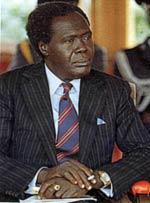Obituary: Milton Obote 1924-2005
 Milton Obote was the first prime minister of a post colonial Uganda, replacing the British colonial administration. He is most famous for being overthrown by Idi Amin in 1971 and regaining power in 1980, only to subject his citizens to death and civil war.
Milton Obote was the first prime minister of a post colonial Uganda, replacing the British colonial administration. He is most famous for being overthrown by Idi Amin in 1971 and regaining power in 1980, only to subject his citizens to death and civil war.The former construction worker came to power in the the Uganda People's Congress. As prime minister, Obote was implicated in a gold smuggling plot, together with Idi Amin, then deputy commander of the Ugandan armed forces. When the the Parliament demanded an investigation of Obote and the ousting of Amin, he suspended the constitution, abolishing the roles of leaders of Uganda's five tribal kingdoms and giving himself almost unlimited power under state-of-emergency rulings; he had several members of his cabinet arrested. Obote's judiciary cleared him of the gold-smuggling charges, but the episode created tensions between him and Mutesa, who was critical of Obote for suspending the constitution. Obote staged a coup against Mutesa and had himself declared president on March 2, 1966.
His socialist ideals made him unpopular with the Western powers, particularly Britain, and his regime was greatly destabilized by the military. In 1971 he was deposed by his army chief, Idi Amin, after which he fled to Tanzania. The British government of Edward Heath is known to have given at least tacit approval for the coup.
After Idi Amin was ousted an election was held and Obote's UPC party was reelected. Nonetheless other political parties believed the elections were rigged, leading to many guerilla rebellions, including Yoweri Museveni's National Resistance Army.
It has been estimated that 100,000 to 300,000 people died as a result of fighting between Obote's UNLA and the Guerillas.
Obote was deposed in 1985 and Museveni to control of Uganda. After his downfall Obote went into exile in Zambia, claiming her would return to Ugandan politics soon.
The war during the 1980s between Museveni's rebel forces and the then President Milton Obote's national army left hundreds of thousands of civilians dead.
But Mr Obote's death led to a change of heart by the Ugandan government.
The BBC's Will Ross in Kampala says that the cabinet was reportedly split over the matter, but when the Ugandan government announced a state funeral for the former president, many Ugandans were surprised.
He says that regional leaders may have played a role in persuading the Ugandan government to honour Milton Obote because of the support he offered during the 1960s to exiled South Africans fighting against white minority rule.


0 Comments:
Post a Comment
<< Home